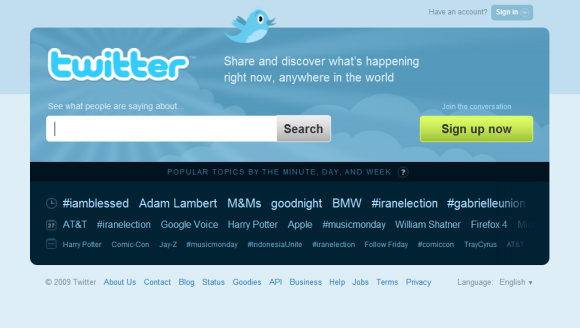Holiday season: 'Out of the office' replies not trendy anymore?
 In our times of social networking, there is an experience that I make which is in some way amusing. In some way it is quite difficult to understand why people do what they do.
In our times of social networking, there is an experience that I make which is in some way amusing. In some way it is quite difficult to understand why people do what they do.
Fact is, people tell their contacts via social networks that they will be going on holidays… and don’t send as many ‘Out of the office’ replies in a reactive way as they used to do anymore. The proactive communication approach via social networks seems to be the future.
Years ago, especially in the holiday season, there was an increase in incoming mails with ‘Out of the office’ replies. No matter if you sent an email, or not. Those automated (response) mails did not surprise anyone anymore. We all got used ti it.
Today these automated mails seem to be decreasing, if not vanishing completely. And there is a reason for it: The digital business world is changing. Why is this happening? Social Networks have taken over the sovereignty of the ‘Out of the office’ reply. And the question that I raised some months ago, if business 3.0 will be nearly without emails, seems to show the first signs of ´modern impact.

If someone is on holiday, we get the notice via social networks… and we receive it already some days before people change their desk chair for a beach bar stool at the pool. People tell us in their status updates when and how long they will be going on holidays. And they do tell us at least some days in advance. If this is clever or not, I have not figured out yet.
The reason behind this preventive behavior seems to be quite obvious because it might also be unnecessary. No ‘Out of the office’ reply means ‘No automated mails’ for business partners, clients or people that did not really think of contacting me while I am sitting in the sand at some beach hundred miles away from work.
It is definitely a good service for a promising partnership. People can plan in advance if they need something from the contact that will be going on holidays.

Nevertheless, some business people -or shall I say social networker- should also think about the possible aftermath as the web is public, others might be listening carefully and messages might get into the wrong hands of burglars or thieves who can also plan in advance where and how to get rich the next day. Although status updates can only be seen by your clients, partners or friends, we all know that we don’t really know everyone in depth as we would love to.
As you see in the picture here, some people also wrote it on Twitter, and I don’t know if this is a safe way…
But letting your contacts know about your holidays via social networks is definitely a business trend and a service that is coming up.
Spot on!
Curious to see if you see this trend as well? How do handle this topic yourself? Do you use status update in order to tell your business partners or friends that you will be going on holidays?
Looking forward to your comments…
PS: Sometimes our German’s offline reputation scares me a bit…


 Don’t we love to play this game with kids because we know how happy it makes them… Pick-a-boo. But as adults using social networks: What is it that makes us happy? Some weeks ago, I asked some friends of mine who in turn asked friends of theirs as well as their colleagues: What is the main benefitial feature of social networks? The most frequent answer that came up was the ‘Who has been on your profile lately’ feature which goes along the lines of ‘The Pick-a-boo’ effect.
Don’t we love to play this game with kids because we know how happy it makes them… Pick-a-boo. But as adults using social networks: What is it that makes us happy? Some weeks ago, I asked some friends of mine who in turn asked friends of theirs as well as their colleagues: What is the main benefitial feature of social networks? The most frequent answer that came up was the ‘Who has been on your profile lately’ feature which goes along the lines of ‘The Pick-a-boo’ effect. Sponsorships on retail sites are more likely to convert into sales than clicks on organic search engine results… and visitors will spend more. This is what a
Sponsorships on retail sites are more likely to convert into sales than clicks on organic search engine results… and visitors will spend more. This is what a  Isn’t it wonderful sometimes. I mean, going on the plane… and going offline. I love it… And this small post is the result of it: obviously online…
Isn’t it wonderful sometimes. I mean, going on the plane… and going offline. I love it… And this small post is the result of it: obviously online… In a lot of talks and meetings with clients I am asked if Twitter is a sales tool. Now, what would you say? The university professor might answer with a Solomonic answer: “Well, it depends how you see it…”. Being a member of the Twitterati it is one of these questions where you have to hold on to your horses in order not to be too excited. The best answer is probably: “Yes, it is… and No, it is not!”…
In a lot of talks and meetings with clients I am asked if Twitter is a sales tool. Now, what would you say? The university professor might answer with a Solomonic answer: “Well, it depends how you see it…”. Being a member of the Twitterati it is one of these questions where you have to hold on to your horses in order not to be too excited. The best answer is probably: “Yes, it is… and No, it is not!”…
 Compared to the old front page (see right), the main benefit of Twitter becomes more clear now for new users and makes the USP of the platform obvious right from the start.
Compared to the old front page (see right), the main benefit of Twitter becomes more clear now for new users and makes the USP of the platform obvious right from the start.
